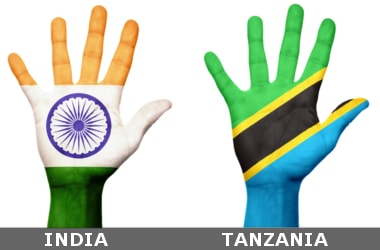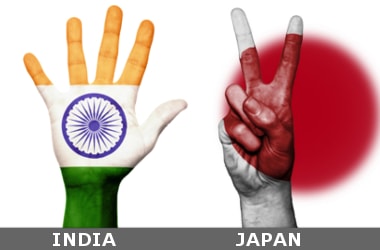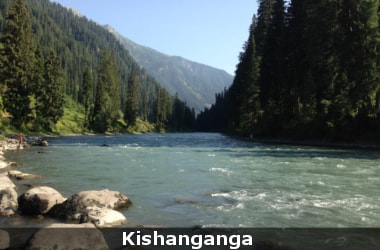National & International Events - Current Affairs for August, 2017
National & International Events Current Affairs for August, 2017
Month wise coverage of National & International Events Current Affairs helps you improve your general knowledge and prepare for all competitive exams like IBPS, Bank PO, SBI PO, RRB, RBI, LIC, Specialist Officer, Clerk, SSC, UPSC, Railway etc. This section is updated daily with the most important events.Preparing National & International Events Current Affairs August, 2017
1. Read the most important National & International Events Current affairs and facts here. 2. Take practice test of our National & International Events MCQ and Objective type questions. 3. Clear any quiz, GK, job interview or competitive exam on current affairs.
- Month & Year
▼ 4th India - Tanzania Joint Trade Committee held [08-30-17]
 The Fourth Session of the India-Tanzania Joint Trade Committee meeting was held in New Delhi, on 29th September, 2017. The Fourth Session of the India-Tanzania Joint Trade Committee meeting was held in New Delhi, on 29th September, 2017.
The Indian delegation was led by Hon’ble Minister for State for Commerce and Industry (Independent Charge) Ms. Nirmala Sitharaman.
The Tanzanian delegation was led by the Hon’ble, Minister for Industry, Trade and Investment Mr. Charles John Mwijage.
Tanzania is one of the most important countries in Africa in so far as India’s bilateral co-operation in various sectors is concerned.
With an investment of US $ 2.2 billion, Tanzania is among the top 5 investment destinations for India.
The Indian side conveyed to the Tanzanian side that the potential areas for Tanzania in India include Light oils and petroleum or bituminous minerals, motor cars and vehicles, medicaments etc
Similarly, Metals and Minerals, dried cashew nuts in shells from Tanzania are required in India.
The Tanzanian side encouraged co-operation in the field of Fisheries, Industrial Development including Industrial Research and Development and SMEs Development, Information, Communication and Technology, Labour and Employment, Information, Culture, Arts and Sports.
The Indian Duty Free Tariff Preference Scheme of which Tanzania is a beneficiary has boosted considerably Tanzanian export to India in recent years. India and Tanzania agreed to enhance sectoral co-operation based on respective needs and comparative advantage for mutual benefit.
In the sectoral co-operation Gems and Jewellery, energy (Hydro/Thermal/Gas/Diesel/solar power plants), Oil and Natural Gas, Mining, Transport, Agriculture, Water Supply Projects, Human Resource Development, Capacity Building and trade promotion were discussed.
|
▼ IMMSAREX on schedule: China, India to participate [08-16-17]
Despite growing tensions with China, the Indian Navy would join the People’s Liberation Army (PLA) Navy in a maiden maritime search and rescue exercise to be chaired by Bangladesh at the Indian Ocean Naval Symposium (IONS) in November 2017.
Bangladesh, the current Chair, is scheduling a maiden International Maritime Search and Rescue Exercise (IMMSAREX) in November in the Bay of Bengal to be attended by ships and aircraft of the members and observers of the IONS.
The IONS is a regional forum of Indian Ocean littoral states, represented by their Navy chiefs, launched by India in February 2008. It presently has 23 members and nine observers.
The exercise comes at a time of intensifying competition among regional navies for dominance in the Indian Ocean — navies of China and Japan, presently observers, in addition to member states like India, France, Iran and the U.K.
In addition, Bangladesh is also scheduling an “extraordinary conclave of Chiefs,” a meeting of chiefs of Navy before it hands over the Chair to Iran next year, the source added.
Under the charter of business adopted in 2014, the grouping has working groups on Humanitarian Assistance and Disaster Relief (HADR), Information Security and Interoperability (IS&I) and anti-piracy now renamed as maritime security.
India has considerably expanded its engagement with countries to further its own interests as well as to check the rapid expansion of Chinese naval forays in the Indian Ocean.
Other countries in the region are also engaged in rapid expansion of their military capabilities.
The working group’s conferences are held annually and India had chaired the one on HADR in May this year and Pakistan had chaired the meeting on IS&I in July.
|
▼ JICF’s first meeting for NE region held [08-4-17]
 The first meeting of the Japan-India Coordination Forum (JICF) for Development of North-Eastern Region was held here today. The first meeting of the Japan-India Coordination Forum (JICF) for Development of North-Eastern Region was held here today.
Secretary, Ministry of Development of North-Eastern Region (DoNER), Shri Naveen Verma led the Indian side while the Japanese delegation was led by the Japanese Ambassador to India, Mr. Kenji Hiramatsu.
Senior Officers of the Ministry of Home Affairs, External Affairs, Department of Economic Affairs, and line Ministries of Government of India including Road Transport & Highways, Agriculture, Power besides Resident Commissioners of the eight States of the NER participated in the meeting.
The Japanese delegation included Mr. Kenko Sone, Minister, Economic Affairs, Embassy of Japan, besides representatives from the Japan International Cooperation Agency (JICA), Japan External Trade Organization (JETRO), Japan National Tourism Organization (JNTO) and Japan Foundation.
Priority areas of cooperation identified by Indian side including Connectivity and Road Network Development, especially inter-State roads & major district roads; Disaster Management; Food Processing; Organic Farming and Tourism were discussed in the meeting.
The regular meetings of the Forum would not only enhance Assistance by JICA but also promote B2B and people to people contacts.
|
▼ India permitted to construct Ratle, Kishenganga projects: WB [08-3-17]
 India is allowed to construct hydroelectric power facilities on tributaries of the Jhelum and Chenab rivers with certain restrictions under the 1960 Indus Waters Treaty (IWT), the World Bank has said. India is allowed to construct hydroelectric power facilities on tributaries of the Jhelum and Chenab rivers with certain restrictions under the 1960 Indus Waters Treaty (IWT), the World Bank has said.
The World Bank’s comments came as officials from India Pakistan concluded the secretary-level talks over the IWT.
Pakistan opposes the construction of the Kishanganga (330 megawatts) and Ratle (850 megawatts) hydroelectric power plants being built by India in Jammu and Kashmir.
Noting that the two countries disagree over whether the technical design features of the two hydroelectric plants contravene the treaty, the World Bank said the IWT designates these two rivers as well as the Indus as the “Western Rivers” to which Pakistan has unrestricted use.
Among other uses, India is permitted to construct hydroelectric power facilities on these rivers subject to constraints specified in annexures to the treaty, the Bank indicated in its fact sheet.
It noted that the talks on the technical issues of the IWT took place this week "in a spirit of goodwill and cooperation".
The parties have agreed to continue discussions and reconvene in September in Washington DC.
In the lengthy fact sheet, the World Bank said Pakistan asked it to facilitate the setting up of a Court of Arbitration to look into its concerns about the designs of the two hydroelectric power projects.
On the other hand, India had asked for the appointment of a neutral expert to look into the issues, contending the concerns Pakistan raised were "technical" ones.
The IWT was signed in 1960+ after nine years of negotiations between India and Pakistan with the help of the World Bank, which is also a signatory.
The World Bank's role in relation to "differences" and "disputes" is limited to the designation of people to fulfill certain roles when requested by either or both of the parties, the fact sheet said.
The two countries last held talks over the two projects in March this year during the meeting of the Permanent Indus Commission (PIC) in Pakistan.
Pakistan had approached the World Bank last year, raising concerns over the designs of two hydroelectricity projects located in Jammu and Kashmir.
It had demanded that the World Bank, which is the mediator between the two countries under the 57-year-old water distribution pact, set up a court of arbitration to look into its concerns+ .
The international lender had in November 2016 initiated two simultaneous processes for appointing neutral expert and establishing of a court of arbitration to look into technical differences between the two countries in connection with the projects.
The simultaneous processes, however, were halted after India objected to it.
After that, representatives of the World Bank held talks with India and Pakistan to find a way out separately.
The talks between the two nations over the treaty come amid tensions between them after a number of terror attacks in India by Pakistan-based terror groups.
|